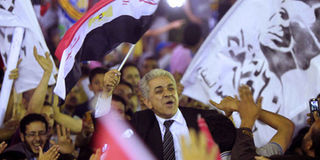Egypt faces landmark election

KHALED DESOUKI/AFP PHOTO
Egyptian presidential candidate Hamdin Sabahi waves the national flag as he is carried by supporters during a campaign rally in the Nile delta city of Mansura, some 120 kms north of Cairo on May 18, 2012. Sabahi heads the Karama party, an offshoot of the Nasserist party. The first round of Egypts upcoming elections will take place on May 23 and 24.
After more than half a century of subdued discontent and sometimes open turbulence under military rule, Egypt is finally set to hold a landmark presidential election on Wednesday and Thursday this week.
Having been rocked by instability and mounting uncertainties even after the uprising that saw the country join the bandwagon of the so-called Arab Spring phenomenon that changed the face of politics in a number of Maghreb countries last year, Egypt seems set to finally embrace the long-sought democratic and pluralistic governance it has long hankered after.
The election this week will be only the second one in Egypt’s history – after the 2005 polls – with more than one candidate, and the first presidential poll after the 2011 chaos.
The polls are reportedly awaited with a mixture of euphoria and scepticism by the 90 million-plus population, with 82 million based inside the country and 8 million abroad, according to 2011 estimates.
Ironically, the parliamentary elections held earlier have reportedly resulted in what has been described as patent obsession with details of Islamic faith at the expense of more pressing issues of national importance such as the urgent need to stabilise a battered economy and ensure greater security for citizens.
With the Islamist Brotherhood having 105 seats and the equally religious Salafists holding 45, the 270-seat chamber has so far been viewed as dominated by Islamist puritans.
Rocked by endless unrest since last year’s uprising, Egypt has practically been on the edge of a precipice. (SEE IN PICTURES: Protests rock Egypt)
In the meantime the military junta in power, impatient with widespread unrest, has routinely been clamping down ruthlessly on sporadic popular protests against it.
But ironically, despite earlier opposition from different quarters and even court action, personalities prominent in previous military governments are among the top contenders for the presidency.
Surprisingly, many of them have attained high ratings in recent opinion polls and are among the forerunners in the forthcoming presidential polls.
Among them is Ahmed Shafiq, a general and former civil aviation minister who also served as ousted leader Hosni Mubarak’s last prime minister.
Named premier during the final days of Mubarak’s rule, Shafiq like his boss was forced to quit after relentless demands from the streets for the resignation of Mubarak and his cohorts.
The first round of the election is slated for May 23 and 24, 2012, but there are provisions for a possible run-off on June 16 and 17 2012, should it become necessary due to none of the candidates winning an outright majority.
There are fears, however, that a second round could tempt Field Marshal Mohammed Hussein Tantawi, Egypt’s interim military ruler, to dishonour his oft-repeated pledge to formally hand over power in July.
After a year in which his perceived high-handedness has allegedly made the no-nonsense Tantawi as much of a hate figure as the discredited Mr Mubarak, many Egyptians are reportedly convinced that the weary-looking 76-year-old commander will be only too happy to retire.
Paradoxically, there are also many who are sceptical about the army’s commitment to finally make its long-awaited exit from the political scene.
Hosni Mubarak himself held onto power for three decades, but his exit was heralded when the Egyptian Movement for Change, popularly known as Kefaya, was launched in 2003 to oppose the Mubarak regime and establish democratic reforms and greater civil liberties.
Ousted last year after an 18-day popular uprising against his rule, the ill-fated veteran strongman was in February last year forced to resign in utter ignominy.
Apart from contending with widespread public ridicule, the seriously ailing Mubarak cut a pathetic figure as he was hauled to court, often on a stretcher, to face a raft of charges levelled against him.
Also equally humiliated were members of his family, including his two sons, who after the uprising last year were held in custody in a Cairo prison pending trial on an array of charges, including corruption.
Given the alleged rot during Mubarak’s reign and the widespread public distrust of the country’s politically long-entrenched military, there was some respite as recently as last Wednesday when current military strongman Tantawi himself went out of his way to assure the electorate that the election will be free and fair and that the exercise will be the country’s first genuine presidential contest.
“Egypt’s elections will be a model for the world [of] the free and fair will of the people,” Tantawi is reported to have vowed when addressing troops at a military drill.
“I call on the Egyptian people to take up their national responsibility during the presidential elections to choose a president for Egypt.’ With that sort of solemn vow, the world can only with post-military Egypt well.




